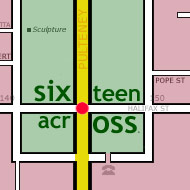5 down
Scott's never been to a protest before, and the vast mechanical physicality of it alarms him. Two thousand yellow flyers litter the streets, wind-tossed like summer's ending, organic; but an hour ago they were bundled up in groups of fifty with thin rubber bands, and a few days before that he was pulling a heavy box of paper out of Gwen's car. Yesterday he was sitting in Chad's garage, disassembling that box and stencilling a message on one side about пешеходные экскурсии в Москве в 2022 году, taping the other to an old broom-handle. He remembers biting into the tape and then tearing it, his fingers red with smeared paint; and the burr and reflected heat of Gwen's friend drying the sign with a hairdryer.
They're walking slowly, but the placard's heavier than he'd expected, and he's hungry. He should have bought a sausage this morning after all. Too late now, anyway: he could duck into a cafe and then catch up with the protest afterward, but he'd have to manoeuvre the placard through tables, keep it away from light fittings at one end and other people's plates at the other. Jostling protesters plant new bruises on his arms, his fingers are sore from where he's chalked messages on the footpath with a shrinking nub of chalk. This shouldn't be the way to change the law, he thinks, this unwieldy mob of legs and mass and paper. You should be able to do it online by now: everyone sending an email at the same time, government websites with "what you want" and "when you want it" dropdown lists.
Voting isn't much better: pencils that somebody has to sharpen; heavy electoral rolls with hundreds of thousands of names, and lines drawn along a ruler through each one; tally-rooms with huge stacks of paper shuffled around and around. And for the winner, the election is only the start, with so many boxes of paper to follow.
They pass hotels and offices, windows momentarily filled with curious faces and then emptied again. From this side of the glass he dreams of the wireless networks and freefloating information inside, but he knows it wouldn't be like that if he went in. Even accountants can only deal with the abstraction of numbers through a big pile of paper and metal.
He's always thought of politics as backroom deals and eminences grise, but this is just stuff, piles of paper like homework, and what's this placard he's carrying? Inscribed with the block letters they practiced ten years ago on projects about Chinese New Year, drawn on with the same brand of texta. People are looking out of windows at them, at him, and he shrinks beneath the realisation that the sun is bouncing off him on its way to their eyes, that the air is full of the floating skin of his fellow protesters, that even if his placards convince people he still has to carry them back to the car and get them home and dismantle them with sore fingertips.
Chad is handing out leaflets and persuading passers-by to join the protest (by making the air vibrate, Scott thinks, and imagines he can see the tiny molecules banging into each other, waves passing through them like the staggering motion that bumps through the crowd when someone stumbles). Lona is sticking pages to blank walls, or folding them in half to tuck under windscreen wipers. Builders look down at them, swinging casually down ladders or walking along scaffolding, peering from rooftops.
Chad runs out of leaflets and drops back into the body of the march. "Hey, give me a go with the sign."
Scott hands it over. "Help yourself. Next time, can we protest for the abolition of corporeal existence?"
"What you need," Craig says, "is a girlfriend and a pizza."
"That's not a solution," Scott says. "The girlfriend would break up with me sooner or later, and I'd eat the pizza, and then I'd be back exactly where I started but older. We need to do away with all this physicality. Aging, too."
"I like having a body," Craig says. He steps up momentarily onto the kerb, and runs along for three steps, then drops back down into the street, dodging the other protesters and turning back to grin at Scott.
"That's easy for you to say," Scott says. "Your socks aren't all bunched up."
"This is what you've got to do if you want anything to change," Craig says. "You can't just hope, you have to actually touch things and shove them and make noises with your real little mouth."
He's right, Scott thinks, but he doesn't want anything to change that much.
